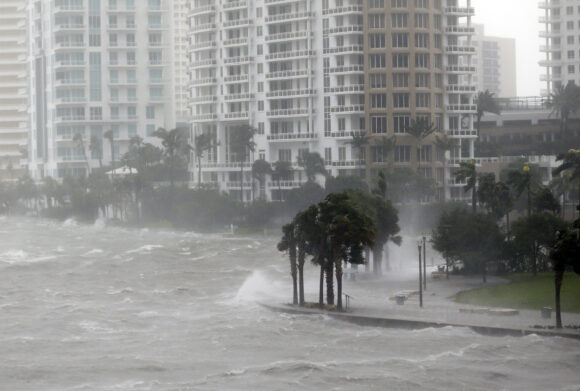Juries that are asked to resolve hurricane-damage disputes often hear widely varying damage estimates from expert witnesses. A decision by a federal appellate court on Monday demonstrates that once a jury decides on a number, insurers may need more than expert opinions to refute it.
A panel of the 11th Circuit Court of Appeal affirmed a jury’s $9,280,000 verdict in lawsuit filed by the owners of a senior living complex against Rockhill Insurance Co. for damage caused by Hurricane Irma. The carrier had argued on appeal that the verdict was excessive and must have been based on “speculation and conjecture” because it didn’t match any of the experts’ estimates.
The appellate panel said it must give deference to a jury’s determination of facts even though the apartment complex owner was seeking the policy limits of $15,112,500 for a total loss.
“Given the conflicting evidence at trial about the extent of the damage to each building individually and whether Hurricane Irma was the cause of the damage, the jury, as factfinder, was free to find that some, but not all, of the buildings sustained damage from the hurricane and to determine the extent of the damage to each building,” the opinion says.
AM Grand Court Lakes LLC and AM 280 Sierra Drive LLC together owned a five-building assisted living facility in Miami Lakes, Florida. In September 2017, Hurricane Irma tore through the area with 100 mph wind.
AM Grand filed a claim asserting that because of hurricane damage, the roofs of all five apartment buildings needed to be replaced a cost of $1.2 million.
Rockhill did not respond until eight months later. It’s own expert estimated that only one roof was damaged by Irma. Damage to the roofs of the other buildings was caused by normal wear and tear, according to Timothy Philmon with Donan Engineering.
Rockhill estimated the damage to be $235,556.80, which was less than the policy deductible of 2% of value, or $330,250.
AM Grand’s owners filed a lawsuit that alleged while they waited for Rockhill to respond to their claim the regular frequent South Florida rains inundated the walls of the five apartment buildings and caused more damage. Structural engineer Al Brizuela said that damage to the walls of the building was so extensive that it would best to demolish the structures and rebuild. Construction manager Alain Gonzalez testified that would costfrom $33 million to $66 million.
The appellate panel said in its opinion that both the insurer or the claimant took an “all-or-nothing” approach. The jury was left to decide whether to side with Rockhill and award nothing or with AM Grand’s owners and award the policy limits.
Or something in between.
Rockhill asked for a new trial after the jury returned the $9,280,000 verdict. The District Court denied the motion and the insurer appealed.
Rockhill argued that the verdict must be based on conjecture because none of the experts had estimated that repairs would cost that amount. AM Grand asked for the policy limits or $1.2 million if the jury decided only the roofs needed repair and not the walls of the buildings. Rockhill’s experts had testified that only one roof needed repair.
The district court, however, said when it denied the insurer’s motion to dismiss that the jury had rejected damage estimates from both sides but arrived at a final number that was “within the range shown by the evidence at trial.”
The 11th Circuit panel said it found no reason to disturb the finding.
“Absent unusual circumstances, the trial court judge who denied the motion for a new trial had ‘the opportunity to observe the witnesses and to consider the evidence in the context of a living trial rather than upon a cold record,'” the panel said, citing a 2018 Supreme Court decision.
The panel affirmed the District Court’s ruling and remanded the case to determine whether to grant a request from AM Grand to force Rockhill to also pay its costs and attorney fees.
Top photo: In this Sept. 10, 2017, photo, waves crash over a seawall at the mouth of the Miami River from Biscayne Bay, Fla., as Hurricane Irma passes by in Miami. Rising sea levels and fierce storms have failed to stop relentless population growth along U.S. coasts in recent years, a new Associated Press analysis shows. The latest punishing hurricanes scored bull’s-eyes on two of the country’s fastest growing regions: coastal Texas around Houston and resort areas of southwest Florida. (AP Photo/Wilfredo Lee)
Was this article valuable?
Here are more articles you may enjoy.


 AI Claim Assistant Now Taking Auto Damage Claims Calls at Travelers
AI Claim Assistant Now Taking Auto Damage Claims Calls at Travelers  Walmart to Pay $100 Million to Settle FTC Case on Driver Wages
Walmart to Pay $100 Million to Settle FTC Case on Driver Wages  NYC Travel Snarled by Snow as Central Park Gets 15 Inches
NYC Travel Snarled by Snow as Central Park Gets 15 Inches  Judge Upholds $243M Verdict Against Tesla Over Fatal Autopilot Crash
Judge Upholds $243M Verdict Against Tesla Over Fatal Autopilot Crash 